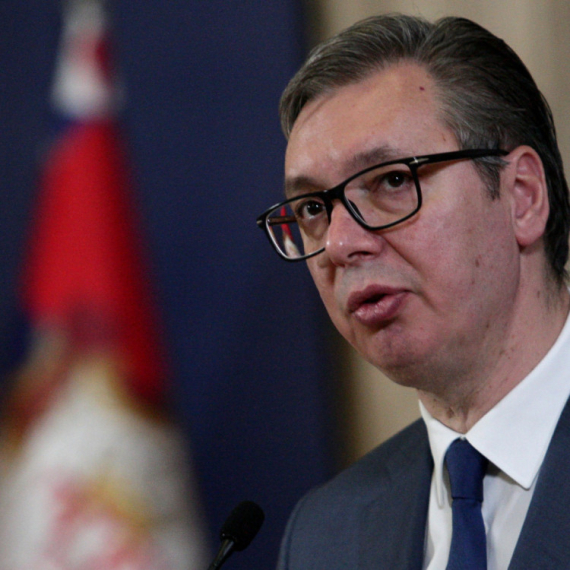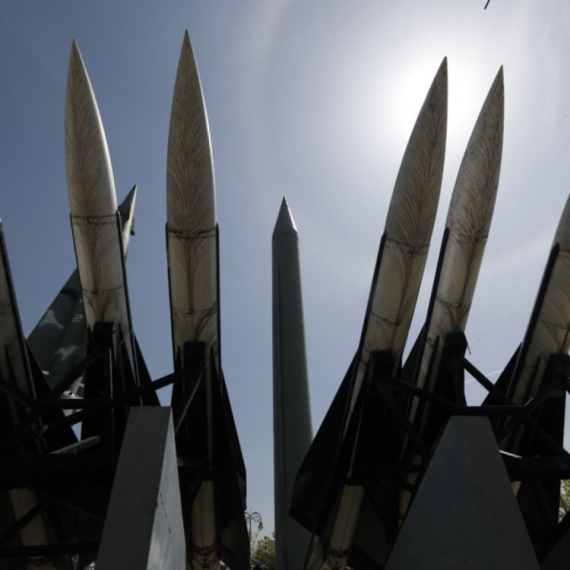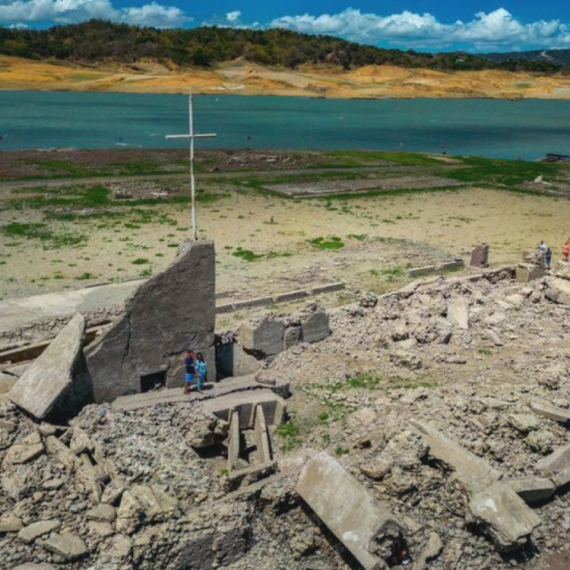Fried: Kosovo should make own decisions
It is up to the Kosovo government whether to accept the UN's six-point plan, Daniel Fried says.
Monday, 17.11.2008.
10:17

It is up to the Kosovo government whether to accept the UN's six-point plan, Daniel Fried says. The U.S. undersecretary of state for political affairs was in Pristina today for meetings with Kosovo Albanian leaders, including President Fatmir Sejdiu and PM Hashim Thaci. Fried: Kosovo should make own decisions "The Kosovo government is a government of a sovereign state that should listen to others, but decide on its own about the interests of its state," Fried said after the meeting. He described the six-point plan as "a temporary solution", and said Washington will continue with its "support and friendship for the government of Kosovo". Fried also urged the EU mission in Kosovo, EULEX, to be set up as soon as possible, and deployed in all of Kosovo in cooperation with the Kosovo government. "The United States has shown that whenever you have any problem, you must bear in mind that we have always kept our word," this diplomat said. The marathon negotiations between Sejdiu and Thaci and western diplomats last week did not reach any solutions for the six-point proposal defining the rights of Serbs the areas where they are a majority. If a solution is not found with Fried today, it is unlikely that Pristina will change its stance on the UN proposal on the reconfiguration of UNMIK, that also deals with the EULEX deployment. Analysts in Pristina said that accepting the plan for would mean that the Kosovo officials would formally lose their sovereignty over North Kosovo, though this sovereignty does not exist essentially. Because of this, Kosovo leaders are asking for guarantees that accepting the plan does not mean that Kosovo will be partitioned or that formal sovereignty over North Kosovo will be lost. However, media in Pristina are reporting that diplomatic sources say the proposal "cannot be altered". Since no solution seems to be in sight, most experts in Pristina believe that Kosovo Albanian officials will maintain their stance and wait to see what New York and Brussels will do next. But both U.S. and EU diplomats seem to be leaning towards the conclusion that EULEX can be deployed and ready to begin functioning in Kosovo regardless of whether an agreement is reached by December. In case of such a decision, the deployment of EULEX in the north, Serb-dominated part of Kosovo would be circumvented, and set aside, leaving space to seek a solution for the situation at a later period. Albanian language media in Pristina state that Sejdiu and Thaci have prepared a letter which they will send to EU Foreign and Security Policies Chief Javier Solana, and that they also expect a written confirmation from him over the mission's deployment. They will reportedly seek guarantees that the mandate of EULEX will be that stated in the EU Ministerial Council’s action plan, passed before Kosovo Albanians declared independence unilaterally. The government in Pristina is also under pressure locally because of a lack of transparency regarding the contents of the six-point proposal. The opposition and various NGOs, including the radical Self-Determination Movement, have criticized the government, while the latter announced protests for this week. Partition, or UNMIK strengthening? Today in Pristina, former Kosovo prime minister Agim Ceku proposed that the Kosovo institutions send an official invitation to EULEX to deploy on the entire territory of Kosovo and for the mission to begin its work on December 2, adding that "any plan that is not the Ahtisaari plan should not be accepted". “The new plan is an attempt to impose a third level of government in Kosovo and initiate a new negotiation process, and that all leads to the idea of partitioning Kosovo territorially,” Ceku said. Meanwhile Kosovo Ministry State Secretary Oliver Ivanovic said that he suspects that Kosovo officials are resisting the UN six-point plan because there are "some big powers that are not interested in seeing a strengthening of UNMIK’s presence". Ivanovic told KiM Radio in Caglavica said that the rejection of the UN plan shows that Pristina "does not understand the reality of the situation". “I think that it looks like the Kosovo Albanians do not want the situation to normalize and they do not want to accept that Serbia received an assignment from New York, along with a letter from Ban Ki-Moon to work on some issues together with the UN mission. There is no other authority as the United Nations exist,” he said. Ivanovic added that it is "still not clear" on whether Fried is trying to convince Kosovo Albanian officials to accept the plan. He said he believes the Albanians have not independently decided by to oppose the six-point plan. “I think that it is not convenient for some big powers for the role of UNMIK to be strengthened through the affirmation of the six-point plan. The reconfiguration of UNMIK calls for a decrease in its numbers, but also an increase in influence. UNMIK will stay put,, and that is what many failed to foresee when they decided to recognize Kosovo’s unilaterally proclaimed independence,” Ivanovic said.
Fried: Kosovo should make own decisions
"The Kosovo government is a government of a sovereign state that should listen to others, but decide on its own about the interests of its state," Fried said after the meeting.He described the six-point plan as "a temporary solution", and said Washington will continue with its "support and friendship for the government of Kosovo".
Fried also urged the EU mission in Kosovo, EULEX, to be set up as soon as possible, and deployed in all of Kosovo in cooperation with the Kosovo government.
"The United States has shown that whenever you have any problem, you must bear in mind that we have always kept our word," this diplomat said.
The marathon negotiations between Sejdiu and Thaci and western diplomats last week did not reach any solutions for the six-point proposal defining the rights of Serbs the areas where they are a majority.
If a solution is not found with Fried today, it is unlikely that Priština will change its stance on the UN proposal on the reconfiguration of UNMIK, that also deals with the EULEX deployment.
Analysts in Priština said that accepting the plan for would mean that the Kosovo officials would formally lose their sovereignty over North Kosovo, though this sovereignty does not exist essentially.
Because of this, Kosovo leaders are asking for guarantees that accepting the plan does not mean that Kosovo will be partitioned or that formal sovereignty over North Kosovo will be lost.
However, media in Priština are reporting that diplomatic sources say the proposal "cannot be altered".
Since no solution seems to be in sight, most experts in Priština believe that Kosovo Albanian officials will maintain their stance and wait to see what New York and Brussels will do next.
But both U.S. and EU diplomats seem to be leaning towards the conclusion that EULEX can be deployed and ready to begin functioning in Kosovo regardless of whether an agreement is reached by December.
In case of such a decision, the deployment of EULEX in the north, Serb-dominated part of Kosovo would be circumvented, and set aside, leaving space to seek a solution for the situation at a later period.
Albanian language media in Priština state that Sejdiu and Thaci have prepared a letter which they will send to EU Foreign and Security Policies Chief Javier Solana, and that they also expect a written confirmation from him over the mission's deployment.
They will reportedly seek guarantees that the mandate of EULEX will be that stated in the EU Ministerial Council’s action plan, passed before Kosovo Albanians declared independence unilaterally.
The government in Priština is also under pressure locally because of a lack of transparency regarding the contents of the six-point proposal.
The opposition and various NGOs, including the radical Self-Determination Movement, have criticized the government, while the latter announced protests for this week.
Partition, or UNMIK strengthening?
Today in Priština, former Kosovo prime minister Agim Ceku proposed that the Kosovo institutions send an official invitation to EULEX to deploy on the entire territory of Kosovo and for the mission to begin its work on December 2, adding that "any plan that is not the Ahtisaari plan should not be accepted".“The new plan is an attempt to impose a third level of government in Kosovo and initiate a new negotiation process, and that all leads to the idea of partitioning Kosovo territorially,” Ceku said.
Meanwhile Kosovo Ministry State Secretary Oliver Ivanović said that he suspects that Kosovo officials are resisting the UN six-point plan because there are "some big powers that are not interested in seeing a strengthening of UNMIK’s presence".
Ivanović told KiM Radio in Čaglavica said that the rejection of the UN plan shows that Priština "does not understand the reality of the situation".
“I think that it looks like the Kosovo Albanians do not want the situation to normalize and they do not want to accept that Serbia received an assignment from New York, along with a letter from Ban Ki-Moon to work on some issues together with the UN mission. There is no other authority as the United Nations exist,” he said.
Ivanović added that it is "still not clear" on whether Fried is trying to convince Kosovo Albanian officials to accept the plan.
He said he believes the Albanians have not independently decided by to oppose the six-point plan.
“I think that it is not convenient for some big powers for the role of UNMIK to be strengthened through the affirmation of the six-point plan. The reconfiguration of UNMIK calls for a decrease in its numbers, but also an increase in influence. UNMIK will stay put,, and that is what many failed to foresee when they decided to recognize Kosovo’s unilaterally proclaimed independence,” Ivanović said.
























Komentari 49
Pogledaj komentare